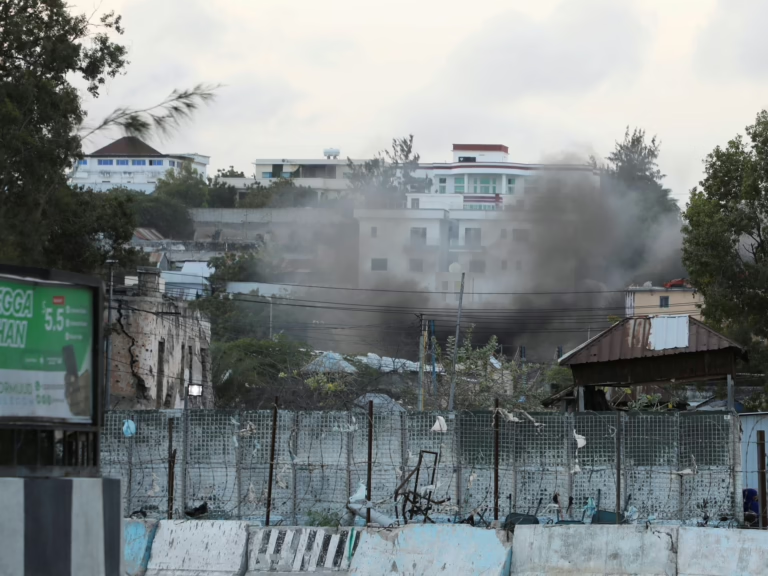Assailants disguised in military attire and driving vehicles resembling those of security forces launched an assault on a high-security detention center in the capital.
Somali authorities have confirmed that all seven militants involved in the attack-ex-sports-ministers-home-in-plateau/” title=”Woman k!lled, police escort injured as gunmen … ex…sports minister's home in Plateau”>brazen attack on a prominent prison facility in Mogadishu were neutralized after a prolonged firefight. This marks the most significant assault on the capital in recent months.
The extremist group al-Shabab targeted Godka Jilow, a subterranean detention center known for housing captured members of the group, on Saturday.
The government reported that the offensive commenced with a vehicle-borne explosive device, triggering intense gun battles and detonations throughout the city. During the counter-operation, three security personnel lost their lives.
Al-Shabab, affiliated with al-Qaeda, claimed responsibility for the attack, stating their objective was to liberate imprisoned comrades.
A security official stationed at the prison recounted to Reuters hearing a “massive explosion at the cell entrance, followed swiftly by gunfire.”
“Additional forces were dispatched to suppress the attackers,” the official added.
State media revealed that the assailants employed vehicles painted to mimic those of the national intelligence agency and donned uniforms closely resembling military attire.
“This tactic allowed them to bypass security checkpoints around the capital with ease, as vehicles belonging to armed forces typically avoid thorough inspections,” explained the Ministry of Internal Security in an official release.
Attack Occurs Shortly After Road Reopenings
The incident unfolded mere hours after the government lifted restrictions on numerous roads in Mogadishu for the first time in over ten years. Prime Minister Hamza Barre highlighted these changes as evidence of “noticeable progress in security.”
Local broadcasters aired footage showing the removal of security barriers.
Godka Jilow prison is a heavily fortified facility located near the presidential palace within one of the city’s most secure districts, casting doubt on the proclaimed improvements in Mogadishu’s safety.
Since 2007, Somalia’s federal government has been engaged in a persistent conflict with al-Shabab. The United States Africa Command (AFRICOM) describes the group as the “largest, most financially robust, and deadliest” al-Qaeda-linked organization worldwide, controlling extensive territories in southern and central Somalia.
Recently, al-Shabab has reversed several government advances by launching a significant campaign in the areas surrounding Mogadishu, seizing key towns such as Adan Yabaal-a critical supply center for Somali forces located nearly 200 kilometers north of the capital.
Between January and July of this year, fighting in the Middle Shabelle region displaced close to 60,000 individuals. According to a report from the Africa Center for Strategic Studies, Somalia accounted for one-third of all fatalities in Africa related to groups ideologically connected to al-Shabab.
Following substantial setbacks for the Somali military, national security adviser Hassan Sheikh Ali resigned in July under circumstances that remain unclear.
In March, al-Shabab targeted the convoy of Somali President Hassan Sheikh Mohamud in Mogadishu as he traveled to the airport, marking what the president described as the fifth assassination attempt by the group.
Last month, the government announced that a member of al-Shabab responsible for this attack was eliminated during an operation conducted by the National Intelligence and Security Agency (NISA).
Despite worsening security conditions in surrounding regions, the capital experienced a period of relative tranquility after the attack on the president’s convoy.
In a late September interview with BBC Somali, President Mohamud stated that no civilians in Mogadishu had been killed by al-Shabab gunfire or explosions for several months, attributing this to enhanced security protocols.






















